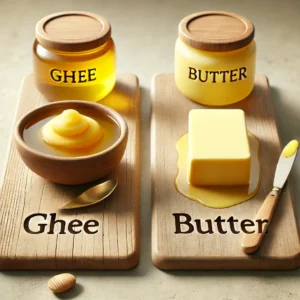Ghee or butter – which one is better for your health? Let’s break it down with a detailed comparison of nutrition, cooking benefits, and health effects. Find out which one best suits your diet!
Table of Contents:
- Introduction: Ghee vs. Butter – The Classic Debate
- Nutritional Comparison
- Digestion & Lactose Sensitivity
- Cooking Benefits & Smoke Point
- Health Benefits: Ancient Knowledge vs. Modern Science
- Weight Management: Does Ghee or Butter Help You Lose Weight?
- Heart Health: Which is Better for Your Heart?
- Which One Should You Choose?
- Conclusion
- References
1. Introduction: Ghee vs. Butter – The Classic Debate
Both ghee and butter have been kitchen staples for generations. While ghee has been a staple of Indian cuisine and Ayurveda, butter has dominated the Western diet. But when it comes to health which one is better? Some people say that ghee is the ultimate superfood, while others argue that butter is a great source of essential fats. Let’s dig into the facts and find out!
2. Nutritional Comparison
| Nutrient | Ghee (per 100g) | Butter (per 100g) |
| Calories | 900 kcal | 717 kcal |
| Saturated Fat | 60g | 51g |
| Monounsaturated Fat | 32g | 21g |
| Polyunsaturated Fat | 4g | 3g |
| Vitamin A | 3069 IU | 2499 IU |
| Vitamin D | 4 IU | 60 IU |
| Omega-3 Fatty Acids | Higher | Lower |
| Lactose | None | Small amount |
Key Takeaways:
- Ghee is rich in healthy fats, including omega-3s, which support heart health and brain function.
- Butter contains small amounts of lactose, which may not be suitable for people with lactose intolerance.
- Both are rich in calories, so moderation is important!
3. Digestion & Lactose Sensitivity
- Ghee is lactose-free, making it a great option for people with lactose intolerance.
- Butter contains some lactose, which may cause digestive problems for sensitive individuals.
- Ghee contains butyrate, a fatty acid known to promote gut health and reduce inflammation.
- From an Ayurvedic perspective, ghee is considered beneficial for improving digestion, metabolism and reducing inflammation.
4. Cooking Benefits & Smoke Point
| Factor | Ghee | Butter |
| Smoke Point | 250°C | 175°C |
| Best For | High-heat cooking, frying, roasting | Baking, sautéing, spreading |
| Shelf Life | Long (does not need refrigeration) | Short (needs refrigeration) |
Why does it matter?
- Ghee is better for cooking at high temperatures as it has a higher smoke point and does not break down easily.
- Butter is best for adding richness to foods like baking and spreading, breads and pastries.
- Ghee has a long shelf life, making it more convenient to store.
5. Health Benefits: Ancient Knowledge vs. Modern Science
🔥 Health Benefits of Ghee 🔥
✔️ Supports immunity – Contains conjugated linoleic acid (CLA) which may help in fighting inflammation. ✔️ Enhances brain function – Traditionally used to improve memory and cognitive function. ✔️ Good for digestion – Helps strengthen gut health and improve metabolism. ✔️ May support heart health – When consumed in moderation, ghee can help maintain good cholesterol levels. ✔️ Rich in antioxidants – Ghee contains fat-soluble vitamins that help fight oxidative stress.
🧈 Health Benefits of Butter 🧈
✔️ Rich in Vitamin A – Essential for eye health and immune function. ✔️ Supports bone health – Contains calcium and vitamin D. ✔️ Contains butyrate – A fatty acid that promotes gut health and reduces inflammation. ✔️ Natural probiotic source – Can aid digestion when consumed in moderation. ✔️ Provides quick energy – Due to its fat composition, butter can be a good energy source.
6. Weight Management: Does Ghee or Butter Help You Lose Weight?
- Ghee contains medium-chain triglycerides (MCTs), which may help boost metabolism and aid fat loss.
- Butter, especially grass-fed, has CLA, which may also contribute to fat loss but in smaller amounts than ghee.
- Both should be consumed in small quantities because they contain high amounts of calories and excessive consumption can lead to weight gain.
7. Heart Health: Which is Better for Your Heart?
- Ghee contains good cholesterol (HDL) boosters, but excessive consumption can still increase LDL cholesterol levels.
- Butter contains high saturated fat, which if consumed in excess can cause heart disease.
- Moderation is key—neither should be consumed in large amounts daily.
8. Which One Should You Choose?
| Criteria | Best Choice |
| High-Heat Cooking | Ghee |
| Lactose Intolerance | Ghee |
| Weight Management | Ghee (in moderation) |
| Baking | Butter |
| Bone Health | Butter |
| Brain Health | Ghee |
| Long Shelf Life | Ghee |
| Probiotic Benefits | Butter |
✅ If you cook at high temperatures or have lactose intolerance, ghee is a better choice. ✅ If you love baking or need a spread for bread, butter is the way to go. ✅ Both can be included in a balanced diet, but the key is moderation.
9. Conclusion
When it comes to ghee vs. butter, there’s no absolute winner – it all depends on your dietary needs and cooking style.
➡️ Ghee is a fantastic option for high-heat cooking, gut health, and those avoiding lactose. ➡️ Butter works great for baking, adding flavor, and providing essential nutrients. ➡️ Choose organic and minimally processed options for both to maximize their benefits.
Ultimately, both ghee and butter have a place in a healthy diet – just remember to use them wisely!
10. References
- Ghosh, S., & Bandyopadhyay, P. (2012). Milk Fat: Sources, Processing, and Health Effects. Journal of Dairy Research.
- Arya, S., & Arya, S. (2016). Ayurveda and Ghee: Benefits and Uses. Indian Journal of Ayurveda.
- Harvard Health Publishing (2020). Butter vs. Ghee: Which One is Healthier?
- National Institute of Nutrition (2021). Nutritional Composition of Indian Foods.
What’s your favorite – ghee or butter? Drop a comment and let’s discuss! 😊🔥

